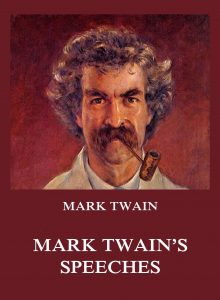Mark Twain’s Speeches – Mark Twain
This book reveals Mark Twain in a new and interesting phase. Mark Twain was first of all a lecturer, almost before he began to write. Conceived and composed to be spoken, these speeches are even more simple and direct than his written works. These speeches are all humorous in their style and method. They show one remarkable thing about Mark Twain’s work, whether spoken or writteu — he never repeated himself. It naturally follows that these lectures cover almost every conceivable subject, from weather and women to politics and fishing. The speeches of Mark Twain, in point of time, cover a little more than half his life. Many of them were delivered at important occasions. Here will be found the speech delivered at Oxford when he received the Doctor’s degree from that university, speeches at various birthday dinners, the address delivered at the Aldrich Memorial meeting, etc.
Format: Paperback
Mark Twain’s Speeches.
ISBN: 9783849674601.
Available at amazon.com and other venues.
Biography of Mark Twain (from Wikipedia):
Samuel Langhorne Clemens (November 30, 1835 – April 21, 1910), better known by his pen name Mark Twain, was an American writer, humorist, entrepreneur, publisher, and lecturer. Among his novels are The Adventures of Tom Sawyer (1876) and its sequel, the Adventures of Huckleberry Finn (1885), the latter often called “The Great American Novel”.
Twain was raised in Hannibal, Missouri, which later provided the setting for Tom Sawyer and Huckleberry Finn. He served an apprenticeship with a printer and then worked as a typesetter, contributing articles to the newspaper of his older brother Orion Clemens. He later became a riverboat pilot on the Mississippi River before heading west to join Orion in Nevada. He referred humorously to his lack of success at mining, turning to journalism for the Virginia City Territorial Enterprise. His humorous story, “The Celebrated Jumping Frog of Calaveras County”, was published in 1865, based on a story that he heard at Angels Hotel in Angels Camp, California where he had spent some time as a miner. The short story brought international attention and was even translated into French. His wit and satire, in prose and in speech, earned praise from critics and peers, and he was a friend to presidents, artists, industrialists, and European royalty.
Twain earned a great deal of money from his writings and lectures, but he invested in ventures that lost most of it—notably the Paige Compositor, a mechanical typesetter that failed because of its complexity and imprecision. He filed for bankruptcy in the wake of these financial setbacks, but he eventually overcame his financial troubles with the help of Henry Huttleston Rogers. He chose to pay all his pre-bankruptcy creditors in full, even after he had no legal responsibility to do so.
Twain was born shortly after an appearance of Halley’s Comet, and he predicted that he would “go out with it” as well; he died the day after the comet returned. He was lauded as the “greatest humorist this country has produced”, and William Faulkner called him “the father of American literature”.
(The text of the last section was taken from a Wikipedia entry and is available under the Creative Commons Attribution-ShareAlike License.)
Publisher’s Note: This book is printed and distributed by Createspace a DBA of On-Demand Publishing LLC and is typically not available anywhere else than in stores owned and operated by Amazon or Createspace.

